THC 15.8 - 19.6%
CBD 0.46 - 0.74%
Effect Sleepy
Flavor Citrus
15.75 - 18.75%
0.19 - 0.47%
0.22 - 0.71%
Sweet, Pine
Sleepy
The cannabis market offers users two variations of Purple Crack strain. The first from Cali Connection, whose breeders crossed Green Crack with Blackwater. And another, more frequently present at the dispensaries, by the way, is from Qola. This one is a child of Green Crack and Juicy Fruit. Both of these options are Sativa based hybrids and deliver an almost identical type of high.
I am always impressed when the high matches the THC levels given. This strain claims to provide between 14 and 19% THC. This seems very reasonable when I consider the high it gave me. I was not too stoned but could still feel my anxiety melt away while my mind opened up. The boost of energy was a great surprise
The aromatic and taste components range much. Qola's Purple Crack cannabis is spicy and pungent with notes of flowers, pine and earth. Another variation smells and tastes more like fresh citrus.
Purple Green Crack strain (as it's another name) has moderate THC levels of 14% - 19%. It is a great choice for smokers with any experience who want to get some subtle Sativa high. It starts soon with the tingles in the face and a boost of energy. The mood uplifts, and blissful euphoria comes up. Users love this high because it is clear-headed, but at the same time, they do experience the feeling of being on the cloud. They reported social gathering to be much easier and more fun with Purple Crack weed strain.
Creativity opens up its doors for art, hobbies and thinking. This weed is best used in the morning or afternoon.
Those who want to ease mild pains find this strain helpful. However, it has more cerebral influence than sedative. It is a great mood booster, helping with depression and stress and ADHD. It also cures headaches and nausea.
Breeders can purchase Purple Crack seeds online. It is recommended to grow them indoors or prepare some odor control because the plants are quite smelly. The flowering cycle usually takes from 7 to 8 weeks.
| THC | Tetrahydrocannabinol, or THC, is a major cannabis chemical compound. It is a psychoactive element that stimulates dopamine release and induces euphoria or happiness. THC-rich strains may be helpful with such conditions as lack of appetite, chronic pains , etc. It is considered to be the primary active marijuana component. | 15.75 - 18.75% |
| CBD | Cannabidiol, or CBD, is a major compound in cannabis, which is non-psychoactive. It is also proved to counteract the side effects of the second major component THC. CBD is widely used for medicinal purposes in rubs, oils and so on. It is helpful in muscle pain cases, may treat arthritis and migraines. Even Greeks used it against pain, while Queen Victoria applied it to get rid of menstrual cramps. | 0.19 - 0.47% |
| CBC | Cannabichromene, or CBC, is a minor cannabinoid, meaning that its quantity in cannabis is quite little. Though it has the same origin as CBD and THC, it is different in functions. Without any psychoactive effects, it is an efficient cannabis compound in combating acne and depression. CBC produces analgesic, antibacterial and anti-inflammatory effects. | 0.2 - 0.49% |
| CBG | Cannabigerol, or CBG, is one of the minor cannabis compounds in adult plants. On the other hand, young ones contain a lot of this antibacterial and anti-inflammatory component. During the growth, CBG is converted into different cannabinoids, mostly THC and CBD. The compound itself increases appetite and decreases eye pressure. | 0.22 - 0.71% |
| CBN | Cannabinol, or CBN, is a trace element in cannabis that is considered to be mildly psychoactive. It appears from oxidation THC, exposed to light and heat. CBN is mostly contained in old cannabis and in traditional hashish. It is effective against insomnia, bacterial infections and appetite loss. | 0.25 - 0.29% |
| THCV | Tetrahydrocannabivarin, or THC-V, is a compound contained in cannabis in trace amounts. Even though it is close to THC molecularly, it is different in effects. This compound may be psychoactive only in large amounts. THC-V reduces blood sugar, controls appetite, stimulates bone growth, etc. African Sativa strains are the richest in THC-V. | 0.4 - 0.98% |
| Carene | Carene (also known as Delta-3 carene) is a terpene found in rosemary, lemons, pines, and cedars, offering citrusy and cypress aroma. Studies on mice showed that carene provides anti-inflammatory effects, as well as promotes bone health and chronic pain relief. | 0.17% |
| Pinene | Pinene is one of the most widespread terpenes in nature, found in pine trees, basil, nutmeg, parsley, and rosemary. Cannabis containing terpene (alpha-pinene or α-pinene) boasts a strong pine scent. Pinene is responsible for anti-inflammatory, pain-relieving, and anti-anxiety effects. | 0.08% |
| Myrcene | Myrcene (also known as β-myrcene) is one of the most common terpenes found in cannabis, representing more than 20% of the modern marijuana terpene profile. Myrcene has a distinct earthy, musky flavor, resembling cloves. It is responsible for calming and soothing effects of weed. Myrcene is also found in hops, thyme, mango, lemongrass, guava melon. | 0.27% |
| Ocimene | Ocimene (derived from the Ancient Greek word Ocimum meaning basil) is a terpene with sweet and herbaceous flavors, also boasting citrusy and woody undertones. Naturally, ocimene occurs in mint, parsley, orchids, hops, kumquats, mangoes, basil, bergamot, lavender, and pepper. Offers antifungal, anti-inflammatory, and antiviral properties. | 0.05% |
| Humulene | Humulene (also known as α-humulene) is one of the major terpenes found in cannabis, contributing to woody, earthy, spicy, herbaceous, and, mainly, floral aromas of cannabis. Used in modern medicine, humulene offers anti-inflammatory, antibacterial, and appetite suppressant effects, which have been well-researched by pharmaceutical companies. | 0.04% |
| Limonene | Limonene (also known as d-limonene) is the second most common terpene in nature and the third most common terpene in cannabis. It has a powerful citrus aroma and can be found in all citruses, including lemons, oranges, grapefruits, limes, juniper, etc. Limonene is known to elevate moods and provide anxiety, depression, and stress relief. | 0.09% |
| Linalool | Linalool (also known as beta linalool, linalyl alcohol, linaloyl oxide, and p-linalool) is one of the rarest terpenes found in cannabis, mostly in small quantities. Linalool is known for its spicy and lavender aroma, bringing relaxation and calming effects. It is also said to provide anti-inflammatory and analgesic properties that can be useful for athletes. | 0.1% |
| Phellandrene | Phellandrene (also known as alpha- and beta-phellandrene) is one of the rare terpenes found in cannabis with antihyperalgesic and antidepressive properties. Phellandrene contributes to a minty, woody, and mildly citrus aroma in cannabis. Previously confused with limonene and pinene, phellandrene was eventually distinguished as a separate terpene common for eucalyptus. Also, it could be found in mint, dill, black pepper, cinnamon, parsley, pine, and lavender. | 0.13% |
| Caryophyllene | Caryophyllene (also known as beta or b caryophyllene) is a terpene found in many herbs and spices, such as black pepper, basil, rosemary, and oregano. Cannabis high in caryophyllene delivers a strong spicy, peppery aroma, resembling cinnamon and cloves. Caryophyllene offers potent anti-inflammatory and sedative effects. | 0.08% |
| Total terpenes content | 1.01% |
THC 15.8 - 19.6%
CBD 0.46 - 0.74%
Effect Sleepy
Flavor Citrus
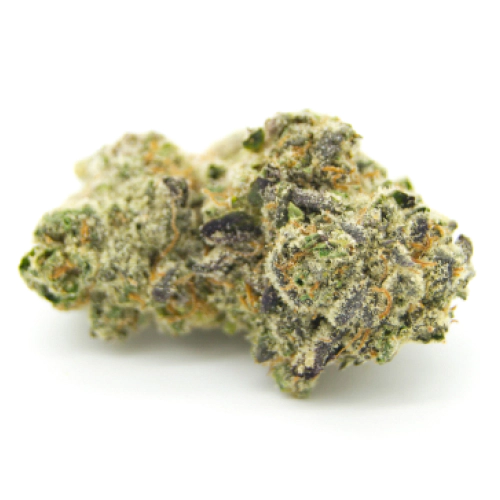
THC 15.75 - 18.25%
CBD 3.3 - 3.8%
Effect Euphoric
Flavor Spicyherbal
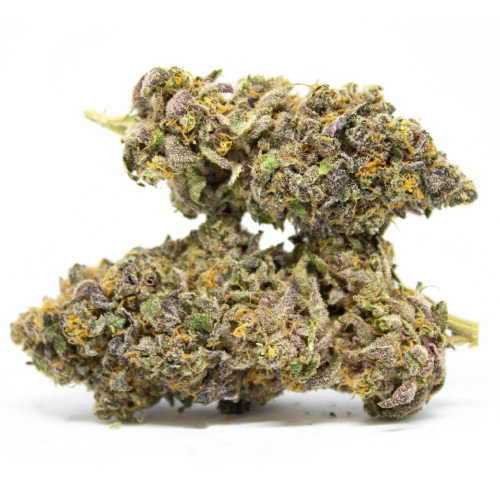
THC 16 - 21%
CBD 0 - 0%
Effect Hungry
Flavor Diesel
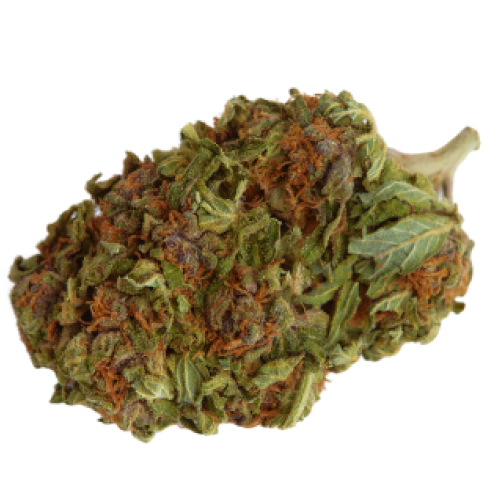
THC 20 - 24%
CBD 0.69 - 1.02%
Effect Uplifted
Flavor Citrus
THC 16.67 - 20.33%
CBD 0.64 - 0.98%
Effect Sleepy
Flavor Grape
THC 17 - 19%
CBD 0.1 - 0.21%
Effect Euphoric
Flavor Lemon
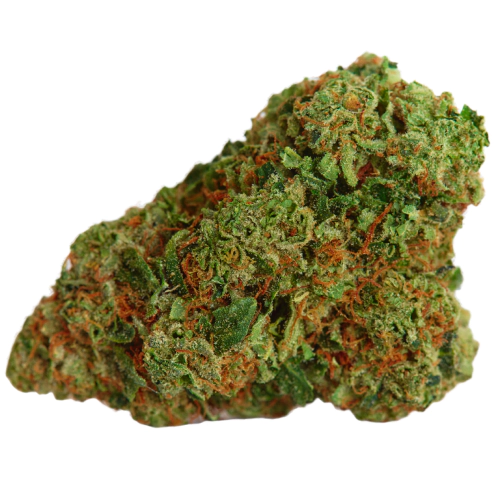
THC 20.2 - 22.6%
CBD 0.62 - 0.94%
Effect Relaxed
Flavor Spicyherbal
THC 19.33 - 21.33%
CBD 0.57 - 0.92%
Effect Uplifted
Flavor Spicyherbal
THC 23 - 25.5%
CBD 0.67 - 0.96%
Effect Relaxed
Flavor Flowery
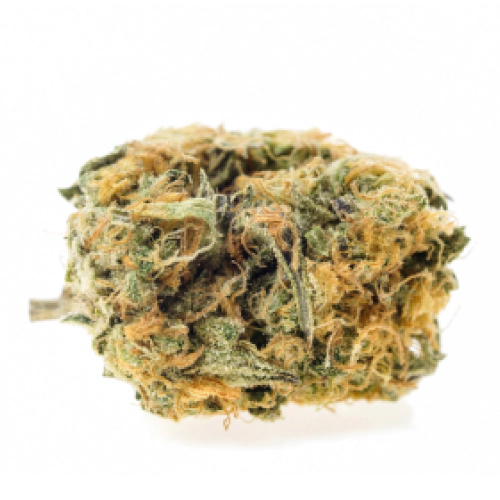
THC 15.75 - 18.75%
CBD 0.19 - 0.47%
Effect Sleepy
Flavor Sweet
THC 20 - 21.67%
CBD 0.53 - 0.83%
Effect Giggly
Flavor Spicyherbal
THC 22 - 23.75%
CBD 0.49 - 0.77%
Effect Sleepy
Flavor Sweet
THC 18 - 19%
CBD 0.6 - 0.95%
Effect Happy
Flavor Skunk
THC 16.5 - 18%
CBD 0.48 - 1%
Effect Sleepy
Flavor Earthy
THC 8 - 11.5%
CBD 0 - 0.02%
Effect Hungry
Flavor Vanilla
User Reviews 6
I am always impressed when the high matches the THC levels given. This strain claims to provide between 14 and 19% THC. This seems very reasonable when I consider the high it gave me. I was not too stoned but could still feel my anxiety melt away while my mind opened up. The boost of energy was a great surprise
I gave purple crack a try because I thought it may help me relax before bed. This was not the case. Instead I felt my mind flowing in a thousand different directions. Certainly not the chill I was looking for.
Heard about this strain from a friend who gave it great reviews. So I filled up the bong and was taken on ajourney. The high is definitely a head one. I even felt tingles in my face which set of the giggles
The batch of dope that I bought was not fruity or flowery
Love me a sweet mary jane that opens up the mind
this is it. This is how you get to cloud nine.
Write a Review